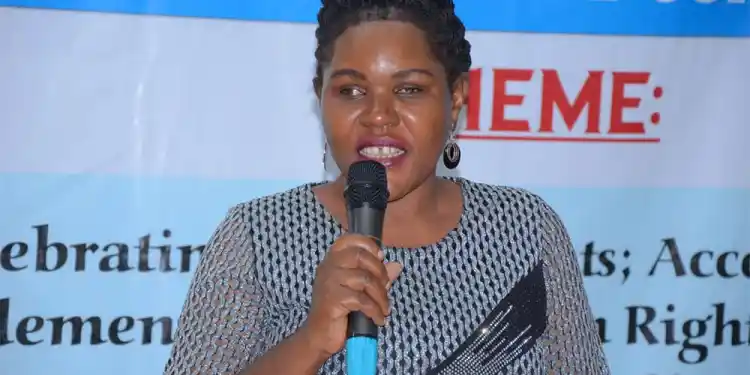Individuals with disabilities have urged the Ministry of Finance, Planning, and Economic Development to set aside a dedicated budget for Rehabilitation and Assistive Technology in the upcoming 2024/2025 financial year.
Ester Kyozira, the Chief Executive Officer of the National Union of Disabled Persons of Uganda (NUDIPU), emphasized the importance of this initiative in closing the service delivery gap and enhancing access to orthopedic care for the wider community.
Assistive technologies (ATs) encompass a broad spectrum of tools, ranging from familiar low-tech items like reading glasses, crutches, and hearing aids to more advanced solutions.
Others include physical aids such as wheelchairs, prosthetic limbs, and white canes, as well as digital innovations like speech recognition software and captioning tools, all designed to improve the quality of life for individuals with disabilities.
Kyozira emphasized the need for the Ministry of Finance to set aside a dedicated budget for the rehabilitation and procurement of Assistive Technology (AT) for persons with disabilities (PWDs) in all government orthopedic hospitals and workshops.
She pointed out that there are significant gaps in the government’s provision of ATs, which are frequently addressed by non-governmental organizations and development partners.
Why they are crucial
She highlighted that the absence of a budget undermines the ability of these facilities to improve service delivery and promote the meaningful inclusion of persons with disabilities (PWDs).
She stressed the significance of assistive devices and assistive technology (AT) for PWDs in Uganda, as they enable individuals to engage more fully in society.
However, there are numerous obstacles to accessing ATs across the country, particularly in government-run orthopedic workshops within hospitals, which struggle to repair or acquire new assistive devices or ATs due to budget constraints.
Kyozira made this observation during the launch of a comprehensive assessment of Uganda’s orthopedic workshops.
The event evaluated the repair services for assistive devices and ATs in both government-operated and private facilities.
A comprehensive evaluation of individuals with disabilities is essential to identify their unique requirements for assistive devices.
These tools, she says, play a vital role in improving mobility, fostering independence, and enhancing overall quality of life, which in turn facilitates greater engagement in society.
The NUDIPU report was delivered by Carolyne Maholo Sserunkuma, a lecturer from Kyambogo University’s Department of Disability Studies, who oversaw the assessment in various hospitals, including those in Jinja, Kumi, Mbale, Soroti, Lira, Gulu, Arua, Fort Portal, Masaka, Mbarara, Wakiso, and Mulago national referral hospitals.
This research aimed to evaluate orthopedic services in Uganda by comparing government-run facilities with private orthopedic centers in different regions.
The researcher also visited CURE Children’s Hospital of Uganda, Comprehensive Rehabilitation Services for People with Disabilities in Uganda (CORSU), and Katalemwa Cheshire Home, a non-governmental organization dedicated to providing comprehensive rehabilitation services for children with disabilities.
Key focus areas of the assessment included resource distribution, availability of equipment, supply chain management, funding, and staffing levels.
The findings of this assessment are intended to support NUDIPU’s advocacy initiatives, ensuring that individuals with disabilities in Uganda can access quality healthcare and fully participate in society.
The study’s objective was to evaluate government-operated orthopedic workshops in Uganda, identify challenges, explore potential improvements, and offer recommendations to guide advocacy efforts.
The ultimate aim was to enhance the capabilities of these facilities to improve service delivery and promote the meaningful inclusion of persons with disabilities.
State of rehabilitation workshops
In an interview, Alex Ndeezi, a Member of Parliament representing the Central region for Disabilities, expressed concerns about the current state of government-operated rehabilitation workshops, stating that it is not satisfactory.
He emphasized that government-run rehabilitation workshops play a crucial role in Uganda’s services for individuals with disabilities.
However, he said an examination of these facilities uncovers both operational strengths and notable accessibility issues, stressing that the provisions for physical accessibility are often inconsistent, with many essential structural adjustments to aid mobility missing, even within the rehabilitation centers.
Ndeezi cautioned that while most facilities feature ramps, appropriately sized doorways, and adequate lighting, they frequently fall short in providing accessible toilets, bathrooms, and modified taps, switches, or beds designed for the needs of persons with disabilities.
He noted that additionally, accessible communication tools such as sign language interpreters, braille materials, and ICT resources are largely lacking in both government and private health facilities, despite their critical role in fostering inclusive rehabilitation.
He further highlighted that healthcare providers frequently have a narrow understanding of the varied needs of individuals with disabilities, which results in insufficient accommodations and ultimately restricts their ability to access services effectively.
He explained that while some staff show a commendable and supportive demeanor towards individuals with disabilities, others display negative attitudes.
He said this could be attributed to low motivation and challenging working conditions within the various facilities, emphasizing the urgent need for enhanced support and training to create a more inclusive and responsive healthcare setting.
John Chriss Ninsiima, the Director Programs at NUDIPU, stated that people with disabilities require orthopedic services to ensure they can live on an equal footing with others.
He said although there are numerous government orthopedic services across the country, many are non-operational, and some have even shut down.
Ninsiima further explained that the government is aware of the demand for such services, but the issue lies in the lack of a dedicated budget for PWDs.
Dr. Moses Fisha Muhumuza, from CORSU Rehabilitation Hospital for PwDs, noted that the initiative originally aimed at producing 3D printed transtibial prosthetics has now broadened to include essential Ankle Foot Orthoses (AFOs or braces), which are crucial for treating conditions like clubfoot, post-injection paralysis, and other prevalent disabilities among children in Uganda.
He urged the government to consistently apply tax exemptions on imported medical equipment, saying that despite the significant costs and time involved, the clearance process has consistently faced delays from URA at Nakawa.

